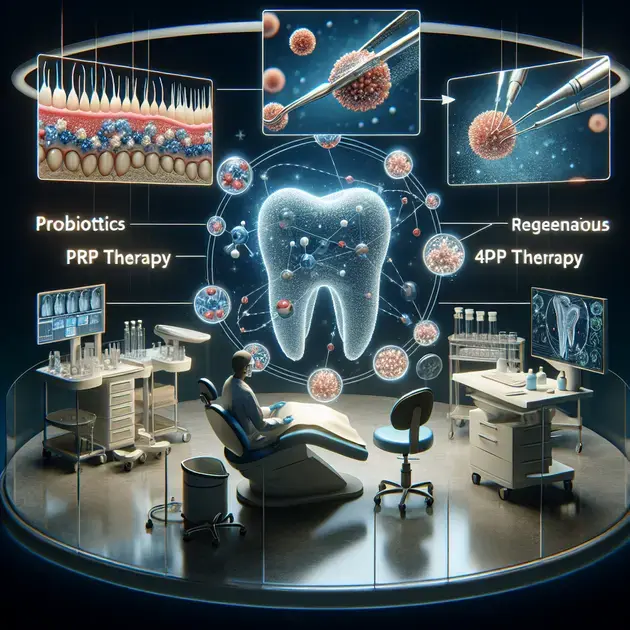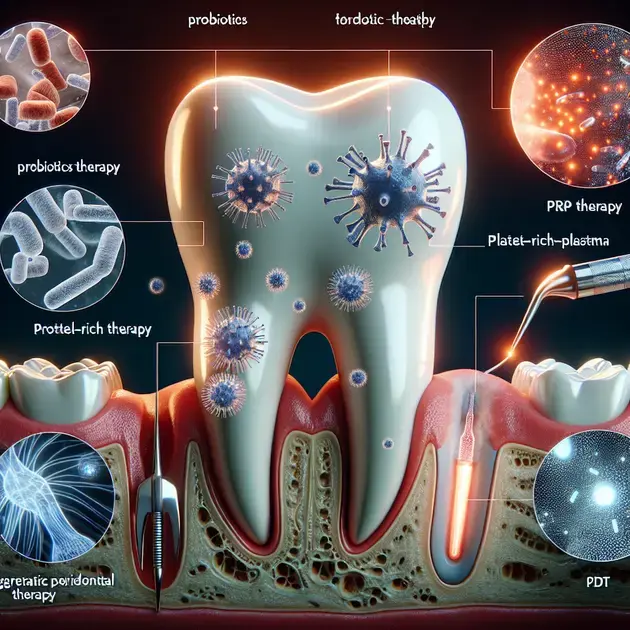Periodontitis is a serious gum infection that damages the soft tissue and destroys the bone that supports your teeth. It is crucial to seek effective medication for periodontitis to prevent the condition from worsening.
In this comprehensive guide, we will explore the latest advancements in periodontal treatment options, including innovative techniques and medications that have shown promising results in managing and treating periodontitis effectively.

Comprehensive Overview of Periodontitis Medication
Periodontitis is a serious gum infection that damages the soft tissue and destroys the bone that supports your teeth. It can lead to tooth loss if left untreated. In this comprehensive overview, we will discuss the various medications used to treat periodontitis.
1. Antibiotics:
Antibiotics are often prescribed to combat the bacterial infection causing periodontitis. Common antibiotics include doxycycline, metronidazole, and minocycline. These medications can be taken orally or applied directly to the infected areas.
2. Antiseptic Mouthwash:
Antiseptic mouthwashes containing chlorhexidine or essential oils can help reduce bacteria in the mouth and prevent further infection. These mouthwashes are often prescribed as part of a comprehensive periodontal treatment plan.
3. Enzyme Suppressants:
Medications that suppress enzymes responsible for the breakdown of gum tissue may also be prescribed. These medications can help slow down the progression of periodontitis and protect the gums from further damage.
4. Anti-inflammatory Drugs:
Non-steroidal anti-inflammatory drugs (NSAIDs) like ibuprofen can help reduce inflammation and pain associated with periodontitis. These drugs can be taken orally or applied topically to the affected areas.
5. Bone Growth Stimulators:
In severe cases of periodontitis where bone loss has occurred, medications that stimulate bone growth may be prescribed. These medications help regenerate the lost bone tissue and restore the support structure for the teeth.
Innovative Techniques for Treating Periodontitis
Advancements in dentistry have led to the development of innovative techniques for treating periodontitis. These techniques aim to improve the effectiveness of traditional treatments and enhance the overall outcomes for patients.
1. Laser Therapy:
Laser therapy is a minimally invasive treatment for periodontitis that uses focused light energy to remove infected tissue and bacteria from the gums. This technique promotes faster healing and reduces the need for traditional surgery.
2. Platelet-Rich Plasma (PRP) Therapy:
PRP therapy involves using the patient’s own blood plasma, enriched with platelets, to promote healing and tissue regeneration in the gums. This technique can accelerate the recovery process and improve treatment results.
3. Guided Tissue Regeneration:
Guided tissue regeneration is a surgical technique that involves placing a barrier membrane between the gum tissue and bone to promote the growth of new bone and gum tissue. This technique helps restore the damaged structures caused by periodontitis.
4. Enzyme Replacement Therapy:
Enzyme replacement therapy involves replacing the enzymes that are deficient in patients with periodontitis. By replenishing these enzymes, the progression of the disease can be slowed down, and the health of the gums can be improved.
5. Nanotechnology-based Treatments:
Nanotechnology-based treatments use nano-sized particles to deliver medications directly to the infected areas in the gums. This targeted approach enhances the effectiveness of the medications and minimizes side effects.
Promising Medications for Managing Periodontitis
Researchers are constantly exploring new medications and treatments for managing periodontitis. The following medications show promise in improving the outcomes of periodontal therapy and reducing the impact of the disease.
1. Host Modulation Therapy:
Host modulation therapy focuses on modifying the host response to periodontal infection, rather than targeting the bacteria directly. Medications like sub-antimicrobial dose doxycycline (SDD) help reduce inflammation and promote tissue repair.
2. Probiotics:
Probiotics are beneficial bacteria that can help restore the balance of the oral microbiome and prevent the overgrowth of harmful bacteria in the mouth. Probiotic supplements or lozenges may be used as adjunctive therapy for periodontitis.
3. Growth Factors:
Growth factors like platelet-derived growth factor (PDGF) can stimulate tissue repair and regeneration in the gums. These medications are applied topically or injected into the affected areas to promote healing and enhance treatment outcomes.
4. Anti-cytokine Therapies:
Anti-cytokine therapies target specific cytokines that are involved in the inflammatory response in periodontitis. By blocking these cytokines, medications like anti-TNF agents can help reduce inflammation and tissue destruction in the gums.
5. Herbal Supplements:
Herbal supplements containing anti-inflammatory and antimicrobial properties, such as green tea extract or curcumin, may help support periodontal health. These supplements can be used in conjunction with conventional periodontal treatments for added benefits.

Innovative Approaches to Enhance Periodontal Health
When it comes to enhancing periodontal health, it is essential to explore innovative approaches that go beyond traditional dental care. One emerging trend in periodontal health is the use of probiotics to promote a healthy balance of bacteria in the mouth. Studies have shown that specific strains of probiotics can help reduce inflammation and improve gum health, ultimately leading to better overall periodontal health.
Another approach to enhancing periodontal health is the use of laser therapy. Laser technology can target bacteria and infected tissue in the gums without the need for invasive surgery. This cutting-edge treatment can help remove bacteria and promote healing, leading to improved periodontal health.
Furthermore, incorporating essential oils into oral care routines can also contribute to enhanced periodontal health. Certain essential oils, such as tea tree oil and peppermint oil, have antimicrobial properties that can help reduce bacteria in the mouth and promote gum health. By incorporating these essential oils into daily oral care, individuals can support their periodontal health.
In addition to these approaches, a holistic approach to oral care, including stress management techniques and a balanced diet, can also play a significant role in enhancing periodontal health. By addressing overall health and well-being, individuals can support their gum health and prevent periodontal disease.
Overall, by incorporating innovative approaches such as probiotics, laser therapy, essential oils, and holistic oral care into daily routines, individuals can take proactive steps towards enhancing their periodontal health and maintaining healthy gums.
New Trends in Periodontitis Medication
With advancements in dental care research, new trends in periodontitis medication are continuously emerging to provide more effective treatment options for patients. One innovative approach in periodontitis medication is the use of targeted drug delivery systems. These systems allow for the precise delivery of medication to specific areas of the gums, ensuring maximum effectiveness in treating periodontitis.
Another trend in periodontitis medication is the development of antimicrobial mouth rinses and gels. These products contain active ingredients that target and eliminate harmful bacteria in the mouth, helping to reduce inflammation and prevent the progression of periodontal disease. Incorporating these antimicrobial products into oral care routines can support periodontitis treatment.
Additionally, the use of personalized medicine in periodontitis treatment is a growing trend. By analyzing a patient’s genetic markers and oral microbiome, dental professionals can tailor treatment plans to address specific risk factors and optimize outcomes. This personalized approach can lead to more effective periodontitis medication and improved patient outcomes.
Furthermore, advancements in regenerative medicine have introduced new possibilities for periodontitis treatment. Techniques such as tissue engineering and growth factor therapy can help promote the regeneration of damaged gum tissue and bone, leading to improved periodontal health and function. These regenerative approaches represent a promising trend in periodontitis medication.
Overall, the evolving landscape of periodontitis medication offers a range of innovative treatments, including targeted drug delivery systems, antimicrobial products, personalized medicine, and regenerative techniques, that can significantly improve patient outcomes and enhance periodontal health.
Cutting-Edge Solutions for Treating Periodontitis
When it comes to treating periodontitis, staying ahead of the curve with cutting-edge solutions is essential for optimal patient care. One innovative solution for treating periodontitis is the use of probiotic supplements. By introducing beneficial bacteria into the oral microbiome, probiotics can help restore balance and reduce inflammation in the gums, supporting the treatment of periodontitis.
Another cutting-edge solution for periodontitis treatment is the use of platelet-rich plasma (PRP) therapy. PRP contains growth factors that can stimulate tissue regeneration and enhance healing in the gums. By applying PRP directly to the affected areas, dental professionals can promote gum tissue repair and improve outcomes for patients with periodontitis.
Incorporating photodynamic therapy (PDT) into periodontitis treatment protocols is another innovative approach. PDT involves the use of light-activated agents to target and eliminate bacteria in the gums, reducing inflammation and supporting the healing process. This non-invasive therapy can be a valuable addition to traditional periodontitis treatment methods.
Furthermore, the use of regenerative periodontal therapy, such as guided bone regeneration and tissue engineering, offers advanced solutions for restoring damaged gum tissue and bone in patients with periodontitis. These regenerative techniques can help rebuild lost tissue and support long-term periodontal health.
By utilizing cutting-edge solutions such as probiotics, PRP therapy, PDT, and regenerative periodontal therapy, dental professionals can provide comprehensive and effective treatment for patients with periodontitis, ultimately promoting better outcomes and improving overall oral health.
**
Conclusion
**
Enhancing periodontal health requires exploring innovative approaches that surpass traditional dental care. Embracing trends like probiotics, which promote a healthy bacterial balance, laser therapy targeting bacteria and infected tissue non-invasively, and essential oils with antimicrobial properties can lead to improved gum health and reduced inflammation, contributing to overall periodontal health.
New trends in periodontitis medication focus on effectiveness and precision. Targeted drug delivery systems ensure medication reaches specific gum areas efficiently. Antimicrobial mouth rinses and gels combat harmful bacteria, while personalized medicine tailors treatments based on genetic markers and oral microbiome, optimizing outcomes. Moreover, regenerative medicine techniques offer hope for healing damaged gum tissue and bone, enhancing periodontal health and function.
Utilizing cutting-edge solutions for periodontitis, such as probiotics restoring bacterial balance, PRP therapy stimulating tissue regeneration, PDT eliminating bacteria with light-activated agents, and regenerative periodontal therapy rebuilding lost tissue, revolutionizes patient care. By combining these advanced treatments, dental professionals can provide comprehensive care, ensuring better outcomes and improved oral health for individuals combating periodontitis.



